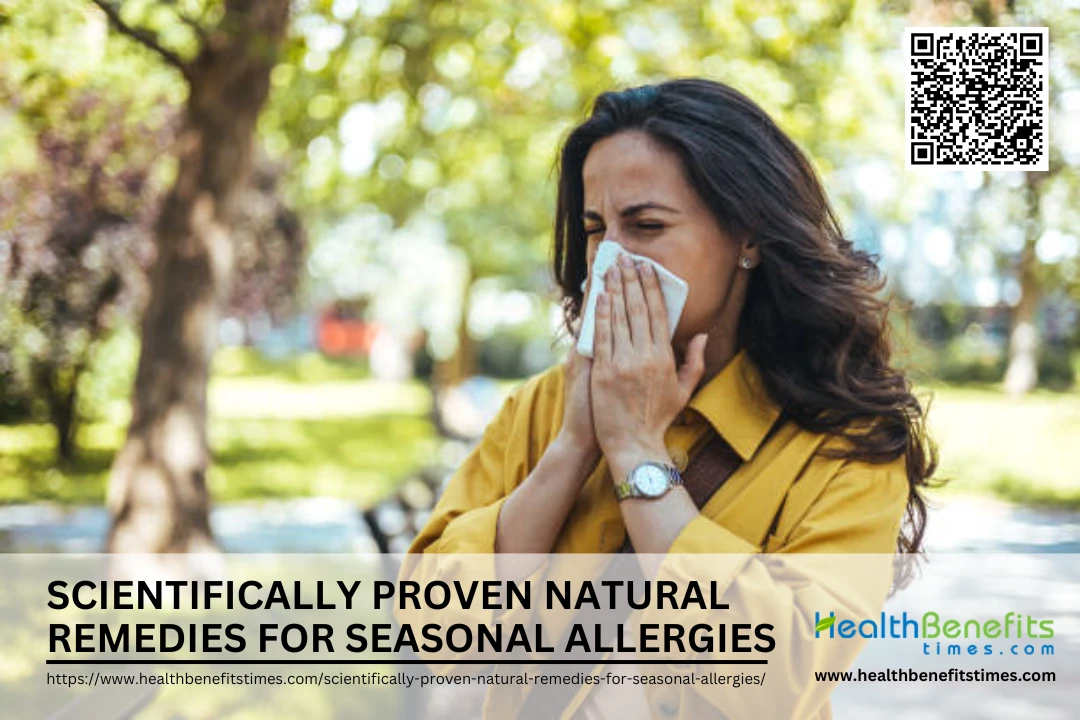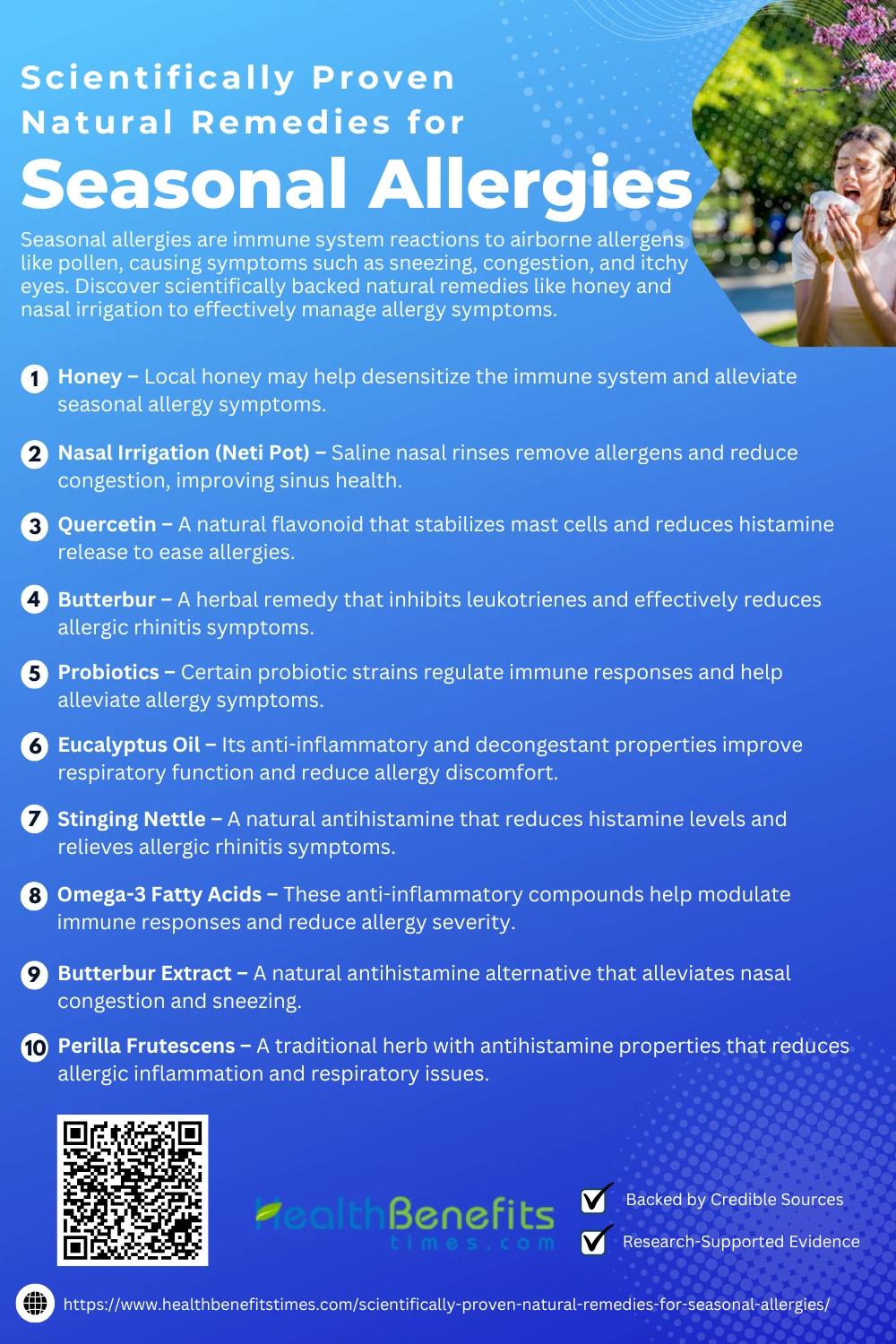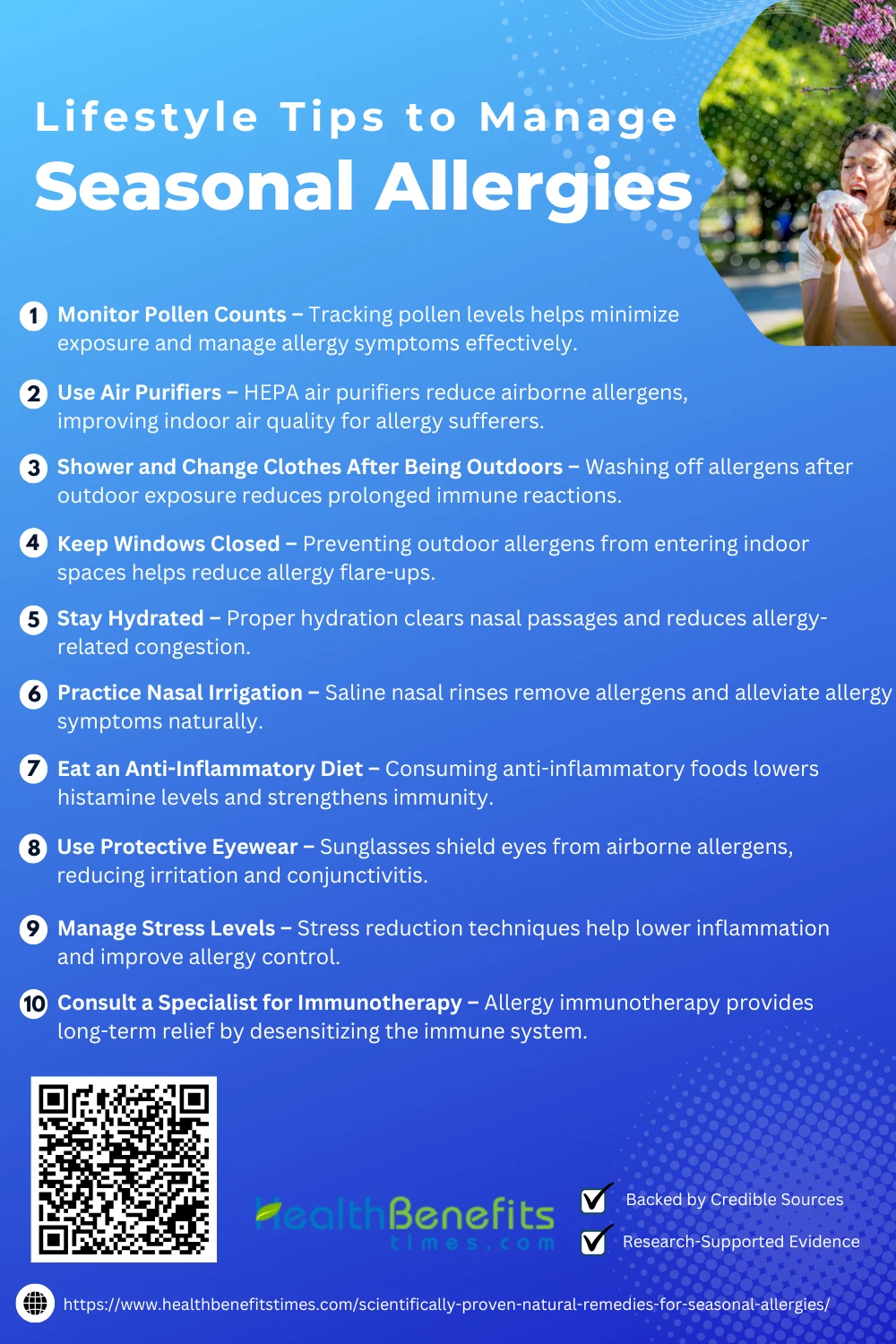- Seasonal allergies are immune system reactions to airborne allergens like pollen, causing symptoms such as sneezing, congestion, and itchy eyes.
- Discover scientifically backed natural remedies like honey and nasal irrigation to effectively manage allergy symptoms.
- These evidence-based solutions offer a safer, holistic alternative to conventional treatments, promoting long-term relief and overall well-being.
 Seasonal allergies, also known as hay fever or allergic rhinitis, are immune system reactions triggered by airborne allergens such as pollen, mold, and dust mites, leading to symptoms like sneezing, congestion, and itchy eyes. For those who suffer from seasonal allergies, natural remedies have been scientifically explored as effective alternatives to conventional medications. Herbal solutions, such as ginger and turmeric, have shown promising anti-inflammatory properties that can help alleviate allergic symptoms by reducing histamine release and calming immune responses. Additionally, lifestyle modifications, including dietary adjustments rich in antioxidants and probiotics, are believed to strengthen the immune system and mitigate allergic reactions naturally. Researchers continue to investigate these holistic approaches to provide safer and more sustainable options for allergy sufferers.
Seasonal allergies, also known as hay fever or allergic rhinitis, are immune system reactions triggered by airborne allergens such as pollen, mold, and dust mites, leading to symptoms like sneezing, congestion, and itchy eyes. For those who suffer from seasonal allergies, natural remedies have been scientifically explored as effective alternatives to conventional medications. Herbal solutions, such as ginger and turmeric, have shown promising anti-inflammatory properties that can help alleviate allergic symptoms by reducing histamine release and calming immune responses. Additionally, lifestyle modifications, including dietary adjustments rich in antioxidants and probiotics, are believed to strengthen the immune system and mitigate allergic reactions naturally. Researchers continue to investigate these holistic approaches to provide safer and more sustainable options for allergy sufferers.
Understanding Seasonal Allergies
Seasonal allergies, also known as allergic rhinitis, occur when the immune system overreacts to airborne allergens such as pollen, mold spores, and dust mites, triggering inflammation in the nasal passages (Frontiers in Allergy). ({% trusted %}) Common triggers include tree, grass, and weed pollen, which vary by season and geographical location. Symptoms often include sneezing, nasal congestion, itchy eyes, and throat irritation, significantly impacting daily activities and sleep quality. Understanding these triggers and symptoms can help individuals manage allergies effectively through preventive measures and treatments.
Scientifically Proven Natural Remedies for Seasonal Allergies
Seasonal allergies can cause discomfort, but scientifically proven natural remedies offer effective relief. From honey to nasal irrigation, explore these evidence-backed solutions to alleviate symptoms and improve your quality of life.
1. Honey
Honey has been studied for its potential benefits in alleviating seasonal allergy symptoms due to its natural pollen content, which may help desensitize the immune system over time. Research suggests that consuming local honey could reduce symptoms of allergic rhinitis by building gradual immunity to pollen allergens. (1) Studies indicate that linden honey, in particular, has properties that may benefit allergy sufferers. (2) Bee pollen components in honey are also known to modulate immune responses and reduce inflammation. (3) Additionally, its antioxidant and antimicrobial properties may provide relief from allergy-related respiratory discomfort. (4) Some studies have also explored honey’s role in improving gut microbiota, which is closely linked to immune health and allergic responses. (5)
2. Nasal Irrigation (Neti Pot)
Nasal irrigation using a Neti pot has been extensively researched as a natural method for relieving seasonal allergy symptoms. Studies show that regular saline nasal rinses remove allergens and reduce nasal congestion, leading to improved breathing. (6) Clinical trials demonstrate that Neti pot use significantly reduces the severity of allergy symptoms compared to conventional treatments. (7) A randomized study confirmed its effectiveness in reducing nasal inflammation and sinus infections in allergy sufferers (Gale). Further research highlights that nasal irrigation strengthens mucosal defenses, reducing allergen sensitivity. (8) Additionally, medical studies confirm that saline rinses enhance overall sinus health and reduce dependency on antihistamines. (9)
3. Quercetin
Quercetin, a plant flavonoid found in onions, apples, and green tea, has been studied for its ability to stabilize mast cells and reduce histamine release, thereby alleviating allergy symptoms. (10) Clinical studies suggest that quercetin, when combined with other bioactive compounds like Perilla frutescens, improves allergic rhinitis symptoms significantly. (11) Research also supports its role in reducing airway inflammation and oxidative stress associated with seasonal allergies. (12) Furthermore, quercetin’s immune-modulating effects contribute to long-term allergy relief. (13) Emerging evidence also suggests its efficacy in enhancing gut microbiota, which plays a crucial role in immune responses.
4. Butterbur
Butterbur (Petasites hybridus) has been studied for its effectiveness in alleviating seasonal allergy symptoms by inhibiting leukotriene production, which contributes to inflammation and congestion. (14) Clinical trials suggest that Butterbur extract (Ze 339) is as effective as antihistamines but without sedative side effects. (15) Research highlights that Butterbur can significantly reduce sneezing, nasal congestion, and eye irritation associated with allergic rhinitis. (16) Additionally, long-term studies indicate that Butterbur is a safe alternative for those seeking a natural allergy remedy.
5. Probiotics
Probiotics have gained recognition for their role in modulating immune responses and reducing allergic reactions. Studies show that certain probiotic strains, such as Lactobacillus and Bifidobacterium, help regulate gut microbiota, which plays a crucial role in immune health and allergy prevention. (17) Clinical trials suggest that probiotic supplementation can significantly reduce nasal congestion, sneezing, and eye irritation in allergy sufferers. (18) Research also indicates that probiotics, when combined with prebiotics, enhance their effectiveness in alleviating allergic rhinitis. (19) Furthermore, emerging evidence suggests that probiotics may reduce inflammation and allergic sensitivity by strengthening gut barrier function. (20) Additional studies highlight that probiotics can help improve lung function and respiratory health in allergy sufferers. (21)
6. Eucalyptus Oil
Eucalyptus oil has been studied for its anti-inflammatory and decongestant properties, making it an effective natural remedy for seasonal allergies. Research highlights its ability to reduce nasal congestion and improve respiratory function by opening airways and reducing mucus buildup. (22) Studies also suggest that inhaling eucalyptus oil vapor can significantly alleviate allergy symptoms such as sneezing and nasal irritation. (23) Additionally, its antimicrobial properties help protect against secondary respiratory infections during allergy season. (24) Further research confirms its role in aromatherapy for allergy relief through steam inhalation and diffusion. (25) The essential oil’s anti-inflammatory effects also contribute to reducing airway inflammation caused by allergens. (26)
7. Stinging Nettle
Stinging nettle (Urtica dioica) has been widely studied for its natural antihistamine properties, making it an effective remedy for seasonal allergies. Research shows that stinging nettle extracts can significantly reduce histamine levels, thereby alleviating symptoms such as sneezing, nasal congestion, and itching. (27) Clinical trials confirm that nettle supplements are effective in reducing allergic rhinitis symptoms compared to traditional antihistamines. (11) Studies also highlight its anti-inflammatory properties, which help in managing immune system responses to allergens. (28) Moreover, stinging nettle contains bioactive compounds that inhibit key inflammatory pathways involved in allergic reactions. Recent findings suggest that regular consumption of nettle-based supplements or teas may provide long-term benefits for allergy sufferers. (29)
8. Omega-3 Fatty Acids
Omega-3 fatty acids, found in fish oil, flaxseeds, and walnuts, have been studied for their anti-inflammatory effects in reducing seasonal allergy symptoms. Research suggests that omega-3s help modulate immune responses and lower histamine production, reducing allergic reactions. (30) Studies indicate that these fatty acids improve airway function and decrease bronchial inflammation in allergic individuals. (31) Omega-3s also contribute to a balanced immune response, which can alleviate hay fever symptoms. (32) Additionally, maternal intake of omega-3s during pregnancy has been linked to a lower risk of allergies in offspring. (33) Further studies confirm their role in mitigating inflammation linked to seasonal allergies. (34)
9. Butterbur Extract
Butterbur extract (Petasites hybridus), particularly the Ze 339 formulation, has been studied for its antihistamine-like effects in treating seasonal allergies. Clinical trials have shown that Butterbur extract can significantly reduce symptoms like nasal congestion and sneezing, making it a natural alternative to conventional antihistamines. (35) Research indicates that Butterbur is as effective as cetirizine but without sedative side effects. (36) Additional studies suggest that it helps alleviate allergic rhinitis symptoms by inhibiting leukotrienes and histamines. (37) A placebo-controlled study confirmed its benefits in reducing allergic inflammation. (38) Recent findings also highlight Butterbur’s anti-inflammatory effects, which can help manage seasonal allergy symptoms more effectively. (39)
10. Perilla Frutescens
Perilla frutescens, a herb used in traditional medicine, has been scientifically studied for its anti-inflammatory and antihistamine properties, making it effective in alleviating seasonal allergy symptoms. Research indicates that Perilla extract reduces nasal congestion, sneezing, and eye irritation by modulating immune responses. (10) Studies suggest that it inhibits histamine release and lowers allergic inflammation, contributing to symptom relief. (40) Clinical trials highlight its role in improving respiratory function in allergy sufferers. (41) Additionally, Perilla-derived flavonoids help suppress immune hypersensitivity reactions. (16)
Lifestyle Tips to Manage Seasonal Allergies
Managing seasonal allergies involves more than just medication. With simple lifestyle changes, like minimizing exposure to allergens and using air purifiers, you can significantly reduce symptoms and improve your daily comfort.
1. Monitor Pollen Counts
Monitoring pollen counts can help individuals avoid peak allergy periods and reduce exposure to airborne allergens. Studies highlight that tracking pollen levels enables proactive measures, such as staying indoors on high-pollen days and using air filtration systems. (42) Research also suggests that real-time pollen monitoring can improve symptom management by helping individuals adjust medications and outdoor activities accordingly. (43)
2. Use Air Purifiers
Air purifiers with HEPA filters effectively capture pollen, dust, and other allergens, significantly improving indoor air quality for allergy sufferers. Clinical research confirms that air purifiers reduce airborne allergens, alleviating symptoms of allergic rhinitis. (44) Another study highlights that air filtration can prevent sensitization and lower the severity of allergic conjunctivitis in patients exposed to environmental allergens. (45)
3. Shower and Change Clothes After Being Outdoors
Pollen and other allergens can cling to hair, skin, and clothing, exacerbating allergy symptoms. Research indicates that showering and changing clothes after outdoor exposure significantly reduces allergen load, helping prevent prolonged immune responses. (46) Additionally, studies suggest that washing hair and skin removes airborne particles that could trigger allergic reactions, improving symptom control for individuals with seasonal allergies. (47)
4. Keep Windows Closed
Keeping windows closed prevents pollen, dust, and outdoor pollutants from entering indoor spaces, reducing allergen exposure. Research confirms that closing windows during high-pollen seasons can significantly decrease airborne allergens indoors, improving respiratory health. Studies also highlight that maintaining a controlled indoor environment, such as using air conditioning instead of natural ventilation, can minimize allergen circulation. (48)
5. Stay Hydrated
Staying hydrated helps thin mucus, keeping nasal passages clear and reducing allergy-related congestion. Research suggests that adequate water intake enhances respiratory function and supports the immune system in managing allergic reactions (Google Books). Additionally, hydration aids in flushing allergens out of the system, preventing excessive histamine release and lowering inflammation caused by seasonal allergies.
6. Practice Nasal Irrigation
Nasal irrigation using saline solutions helps remove allergens from nasal passages, reducing congestion and irritation. Research confirms that regular nasal rinsing alleviates symptoms of allergic rhinitis by flushing out pollen and other irritants. (1) Studies also highlight its effectiveness in maintaining nasal mucosa health and reducing reliance on antihistamines for allergy relief. (7)
7. Eat an Anti-Inflammatory Diet
An anti-inflammatory diet rich in omega-3 fatty acids, quercetin, and vitamin C can help reduce allergy symptoms by lowering histamine production and strengthening immune responses. Research suggests that consuming foods like berries, leafy greens, and turmeric can alleviate inflammation and ease respiratory distress caused by allergens. (49) Additionally, studies indicate that dietary modifications focusing on whole, unprocessed foods can significantly improve immune regulation and reduce seasonal allergy severity. (50)
8. Use Protective Eyewear
Wearing sunglasses or wraparound eyewear helps protect the eyes from airborne pollen and other allergens, reducing irritation and allergic conjunctivitis symptoms. Research highlights that protective eyewear acts as a barrier, minimizing direct exposure to allergens in outdoor environments. (51) Studies also confirm that specialized anti-pollen glasses can significantly lower eye redness, itching, and watering associated with seasonal allergies. (7)
9. Manage Stress Levels
Stress can weaken the immune system and exacerbate seasonal allergy symptoms by increasing inflammation and histamine release. Research indicates that stress management techniques like meditation and exercise can help reduce allergic responses and improve symptom control. (52) Additionally, studies highlight that psychological stress may contribute to allergy flare-ups, making relaxation techniques an essential part of allergy management. (53)
10 Consult a Specialist for Immunotherapy
Immunotherapy is a long-term treatment that helps desensitize the immune system to allergens, reducing symptom severity. Research confirms that allergen immunotherapy can provide lasting relief by modifying immune responses to common triggers. (54) Studies also suggest that consulting an allergy specialist ensures tailored treatment plans, optimizing immunotherapy effectiveness and reducing reliance on medication. (55)
Conclusion
In conclusion, natural remedies such as honey, nasal irrigation, and probiotics offer scientifically supported solutions to manage seasonal allergies effectively. Incorporating these methods into your routine can provide relief while reducing dependence on conventional medications. However, it’s essential to consult a healthcare professional before trying new remedies, ensuring the best approach for your specific needs. With the right combination of natural treatments and lifestyle adjustments, you can experience significant improvement in allergy symptoms and overall well-being.




